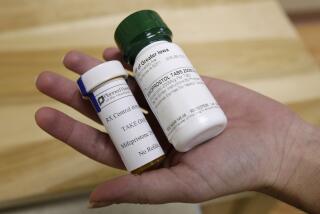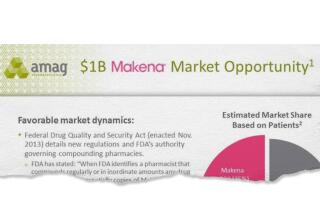Pfizer Recovers Some Loss in Shift to Celebrex
- Share via
Pfizer Inc. arthritis drug Celebrex has been the biggest beneficiary of last month’s withdrawal of Bextra, a pain reliever made by the same company.
Celebrex has grabbed about a third of Bextra’s prescriptions while Mobic, a pain reliever marketed by Boehringer Ingelheim and Abbott Laboratories Inc., has captured about 26%.
Pfizer removed Bextra from the market April 7 at the request of the Food and Drug Administration, which was concerned about its links to heart attacks and a rare skin condition.
Analysts said the shift to Celebrex was a glimmer of good news for Pfizer, but they noted that the glory days of the drug were firmly behind it as doctors had increasingly shifted patients to other prescription medications or over-the-counter products. Safety concerns have contracted the entire market for arthritis drugs, but Celebrex’s slide has been deeper than the overall drop.
Celebrex, like Bextra and the also-withdrawn Vioxx from Merck & Co., belongs to a class of drugs known as Cox-2 inhibitors. Last year all were linked to an increased risk of heart attacks. The finding inclined doctors to prescribe Mobic as well as older drugs such as ibuprofen and naproxen. But last month the FDA said all non-steroidal, anti-inflammatory drugs including Celebrex, Mobic, naproxen and ibuprofen must carry a warning about potential cardiovascular risks.
“The market is in a state of flux,” said Dr. Steven Abramson, chairman of rheumatology at New York University-Hospital for Joint Disease. “I don’t know where we see the bottom of the market, but there is a real need for these drugs.”
In the weeks since Bextra’s withdrawal, Abramson said he had switched patients to drugs including Celebrex, Mobic and naproxen. He said overall, doctors were prescribing lower doses and limiting the time patients take the medications.
Although the FDA’s decision on Bextra and the other pain relievers created confusion for doctors and patients, it certainly shook Pfizer. Just two days before the company pulled Bextra off the market, Pfizer executives had told analysts and journalists that they believed sales of both Celebrex and Bextra could be revitalized as part of a strategy to return the company to double-digit growth by next year.
They haven’t backed away from that projection. However, the company did lower its after-charges earnings projection for this year to $1.98 a share from $2 as it took a $766-million charge during the first quarter for halting Bextra sales.
Analysts had noted that Celebrex would pick up some Bextra sales.
For the week ended May 6, Celebrex picked up 34% of Bextra’s prescriptions, according to Verispan, which tracks prescription data. A week earlier, it grabbed 32%. For the week ended May 6, Celebrex’s total prescriptions reached 228,898, and new prescriptions came to 92,674 -- its best showing in at least three months.
Last year Celebrex generated $3.3 billion in sales, and Bextra revenue was $1.3 billion.
Shares of Pfizer fell 3 cents Tuesday to $28.20 on the New York Stock Exchange.
More to Read
Inside the business of entertainment
The Wide Shot brings you news, analysis and insights on everything from streaming wars to production — and what it all means for the future.
You may occasionally receive promotional content from the Los Angeles Times.










